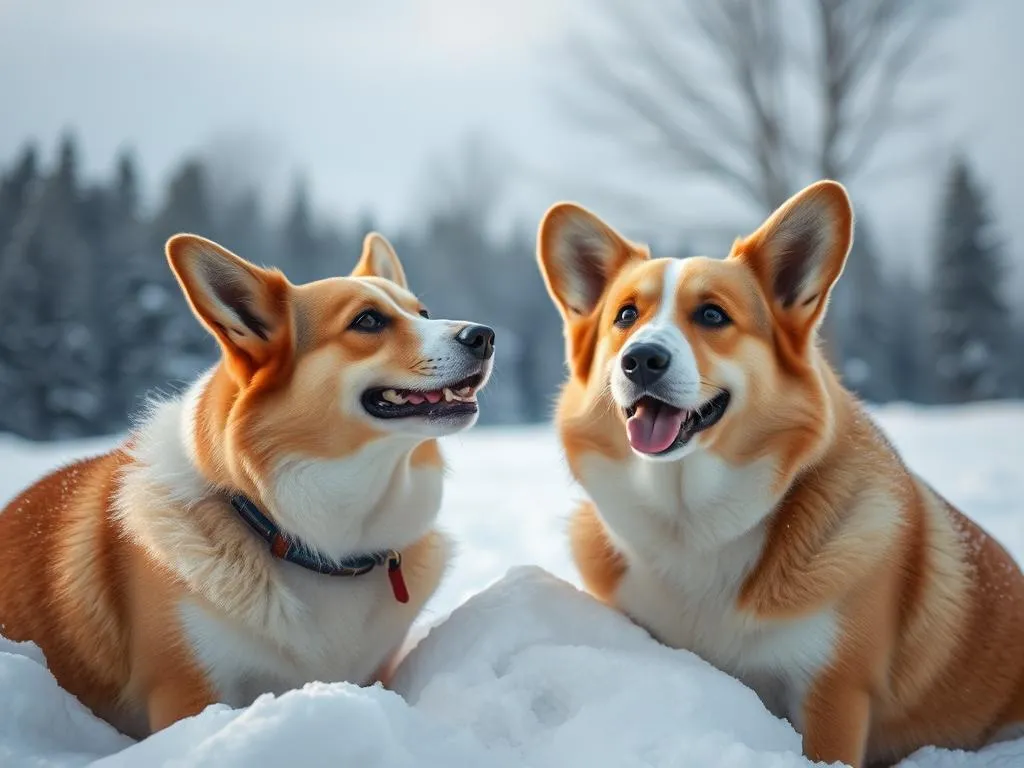
Introduction
Corgis, beloved for their charming personalities and distinctive appearances, come in two primary breeds: the Pembroke and the Cardigan. Both breeds are well-known for their playful demeanor and intelligence, making them popular choices for families and individuals alike. Understanding the characteristics of these breeds is crucial, especially when considering their adaptability to various climates. One common question among Corgi owners and enthusiasts is: do Corgis like cold weather or snow?
In this article, we’ll delve into the unique traits of Corgis that influence their climate preferences, explore how they react to snow, and provide essential care tips for keeping your furry friend safe and happy during the chilly months.
Understanding Corgis
History and Origin
The Pembroke Corgi and Cardigan Corgi have distinct historical backgrounds. Pembroke Corgis trace their roots back to Wales, where they were primarily used as herding dogs. Their short stature allowed them to nip at the heels of cattle while remaining out of reach. On the other hand, Cardigan Corgis have a longer history, believed to be descended from the Swedish Vallhund. They were also used for herding but had a broader role as working dogs on farms.
Both breeds exhibit unique adaptations to their environments, reflecting their roles in herding and guarding livestock. Understanding this history can shed light on their physical and behavioral traits, which may influence their comfort in various climates.
Physical Characteristics
Corgis are small but sturdy dogs, typically weighing between 25 to 30 pounds. They possess thick, double coats—composed of a soft undercoat and a coarse outer layer—which help insulate them against cold weather. The Pembroke Corgi is slightly smaller and has a more fox-like face, while the Cardigan Corgi tends to have a rounder face and larger ears.
These physical characteristics not only make Corgis adorable but also provide them with a level of insulation that can be beneficial in colder climates. However, their short legs can limit their ability to navigate deep snow, which is an important consideration for owners in snowy regions.
Temperament and Behavioral Traits
Corgis are known for their playful, affectionate, and intelligent personalities. They are highly social animals, thriving in environments where they can interact with people and other pets. Their adaptability to different environments is remarkable, as they can adjust to both bustling households and quieter settings.
Corgis are also energetic, requiring regular exercise to keep them healthy and content. This energy can be particularly evident when they encounter new experiences, such as snow. Understanding their behavioral traits can help owners gauge how their Corgis might react to cold weather.
Climate Preferences of Corgis
General Temperature Tolerance
Corgis generally have a good tolerance for colder temperatures, thanks to their thick fur. However, they are not immune to the risks associated with extreme cold. Unlike some dog breeds that are bred specifically for cold climates, Corgis can struggle when temperatures drop significantly.
When comparing Corgis to breeds like Siberian Huskies or Alaskan Malamutes, it’s clear that while Corgis can handle some cold weather, they do not possess the same level of endurance in extreme conditions. Understanding these differences can help owners make informed decisions about their Corgis’ outdoor activities during winter months.
Corgis in Cold Weather
Corgis’ double coats provide a level of protection against cold climates. Their fur acts as insulation, keeping them warm during chilly days. However, experiences shared by Corgi owners indicate that while they can tolerate cold weather, they may not necessarily enjoy it. Many Corgis will frolic and play in the snow, yet they might prefer to retreat indoors after a short period.
Anecdotal evidence suggests that Corgis with thicker coats tend to enjoy cold weather more than those with thinner fur. Observations include playful behavior in the snow, such as bounding and rolling, but also a desire to seek warmth after brief outdoor play.
Do Corgis Like Snow?
Behavioral Reactions to Snow
When Corgis encounter snow, their reactions can be quite entertaining. Many exhibit playful behaviors, such as jumping, digging, and rolling in the snow. Their curiosity often leads them to explore the snowy landscape, showcasing their energetic and playful nature.
However, it’s essential to note that not all Corgis will enjoy snow equally. Some may find the cold uncomfortable and prefer to stay indoors. Observing your Corgi’s behavior in the snow can provide insights into their preferences. If they seem excited and engaged, they likely enjoy the snow; if they shiver or seek shelter, they may not appreciate the cold as much.
Safety and Health Considerations
While Corgis may enjoy playing in the snow, there are health risks associated with cold exposure. Hypothermia and frostbite are potential threats, especially for Corgis that are not accustomed to harsh winter conditions. Signs of discomfort can include shivering, whining, and reluctance to move.
To ensure your Corgi remains safe during cold weather, it’s crucial to monitor their time outside. Limiting outdoor playtime to 15-30 minutes at a time in extremely cold conditions can prevent exposure-related issues. Always check their paws for ice buildup, as snow can accumulate between their toes, leading to discomfort.
Caring for Corgis in Cold Weather
Preparing for Cold Weather
Preparing your Corgi for winter involves several essential steps. First, grooming is critical, as maintaining a healthy coat can help with insulation. Regular brushing can remove dead hair and prevent matting, which is especially important in cold conditions.
Providing proper shelter and bedding is also crucial. Ensure your Corgi has a warm, dry place to retreat to when the temperatures drop. Indoor spaces should be draft-free and cozy, allowing them to stay warm when not playing outside.
Outdoor Activities
When engaging your Corgi in winter activities, consider their physical limits. Short, frequent play sessions are ideal, allowing them to enjoy the snow without overexerting themselves. Activities like short walks, fetch, or even agility exercises in the snow can keep them active and entertained.
Be mindful of the outdoor conditions; if it’s particularly cold or windy, it may be best to keep outdoor time to a minimum. Always keep an eye on your Corgi’s behavior and comfort level during winter outings.
Nutrition and Hydration
Dietary adjustments can be beneficial during cold weather. Corgis may require slightly more calories to maintain their energy levels in colder temperatures. Consult with your veterinarian about appropriate feeding guidelines during winter months.
Hydration is equally important. Ensure your Corgi has access to fresh, unfrozen water at all times. Dehydration can occur even in winter, so monitoring their water intake is essential.
Alternative Solutions for Cold Weather
Dog Apparel
Investing in winter gear for your Corgi can significantly enhance their comfort during cold weather. Dog jackets, sweaters, and boots can provide extra warmth and protection from the elements. Look for apparel that fits snugly but allows for free movement.
Boots are particularly useful for protecting their paws from snow and ice. Keep an eye on their reaction to wearing clothing, as some Corgis may need time to adjust to the sensation of wearing gear.
Indoor Activities
When outdoor play is limited due to extreme cold, it’s essential to have fun indoor activities to keep your Corgi engaged. Puzzle toys, treat dispensers, and interactive games can provide mental stimulation and help alleviate boredom.
Training sessions can also be a great way to keep your Corgi active indoors. Teaching new tricks or reinforcing existing commands can be both rewarding and beneficial for your dog’s cognitive health.
Conclusion
In summary, Corgis possess a unique ability to adapt to cold weather thanks to their insulating fur and playful nature. While they may enjoy the excitement of playing in the snow, it’s essential for owners to monitor their comfort and safety during cold conditions. By taking the necessary precautions and providing proper care, you can ensure that your Corgi thrives in winter weather.
Understanding your Corgi’s preferences and needs in varying climates is a vital part of responsible pet ownership. Share your experiences with Corgis in cold weather, and consider how you can make the winter months enjoyable and safe for your furry friend.









